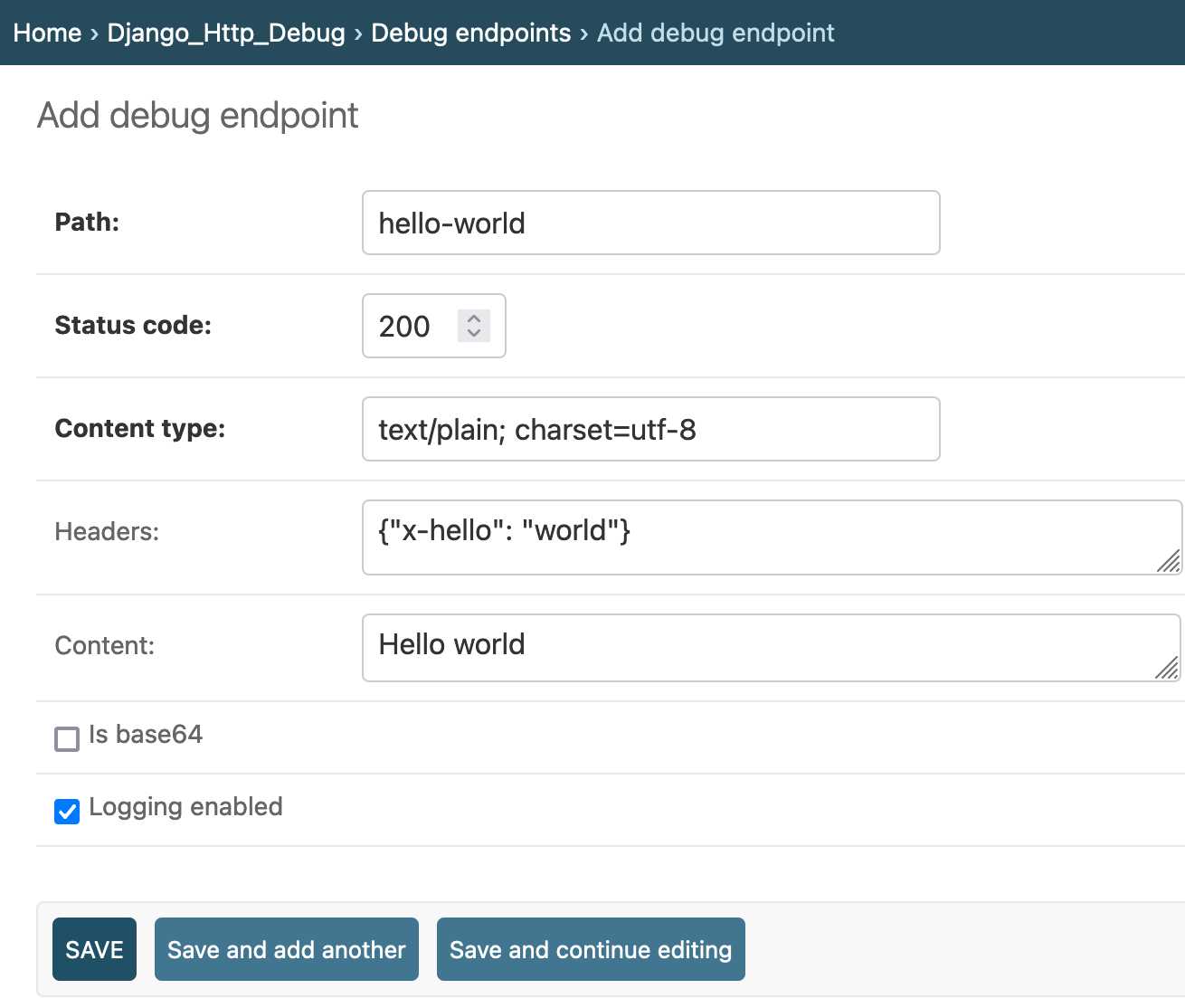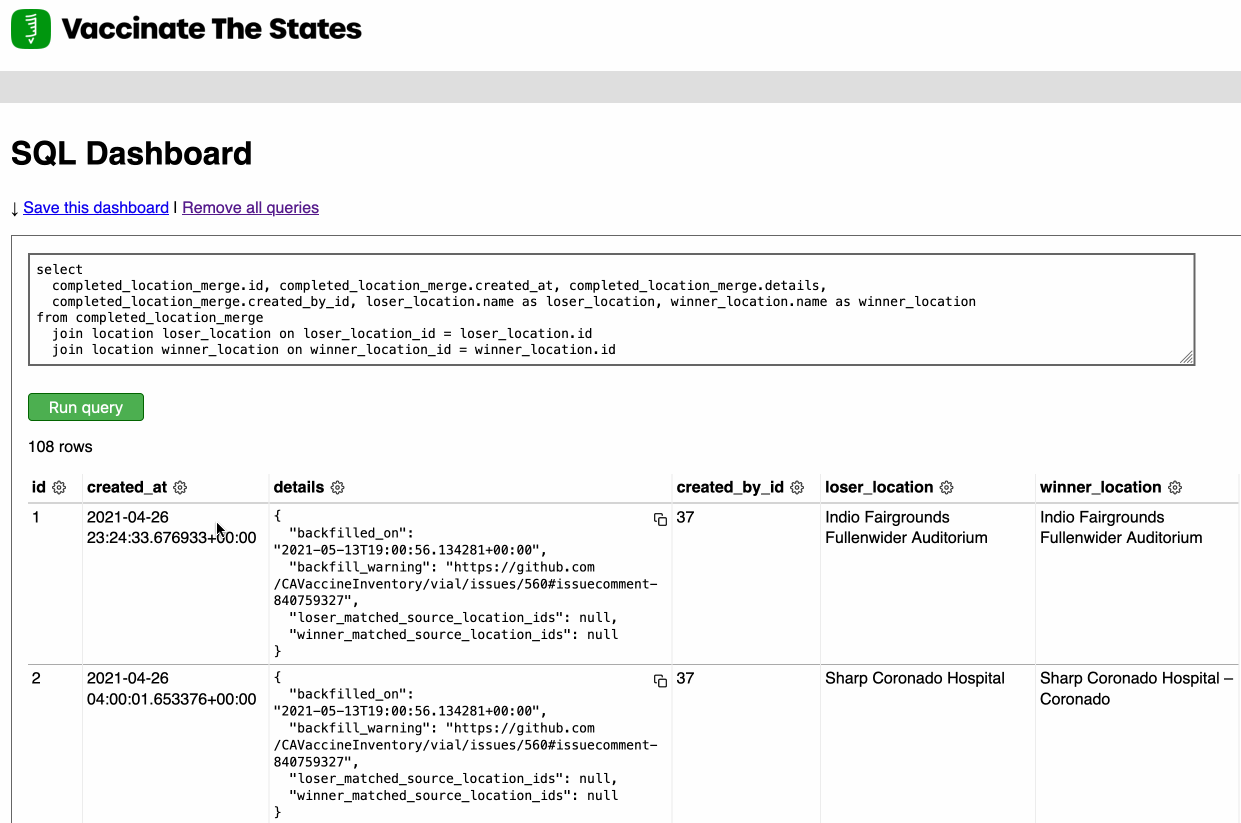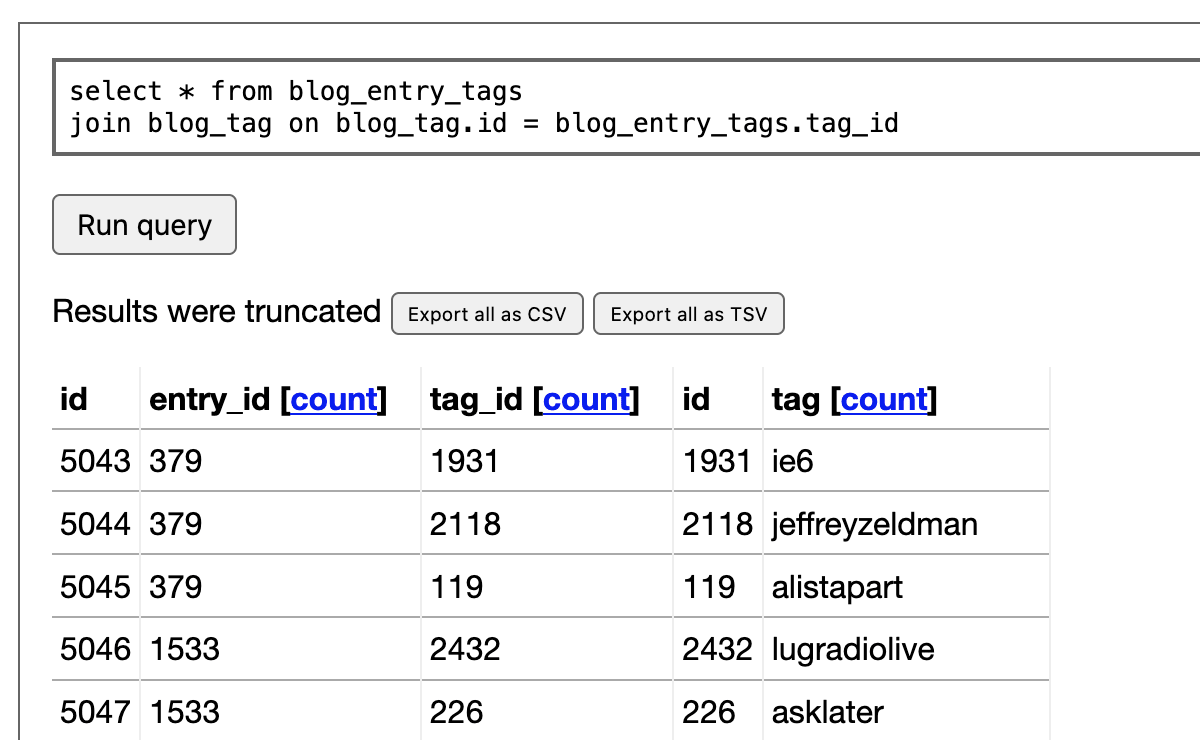583 posts tagged “django”
The Django web framework.
2024
nanodjango. Richard Terry demonstrated this in a lightning talk at DjangoCon US today. It's the latest in a long line of attempts to get Django to work with a single file (I had a go at this problem 15 years ago with djng) but this one is really compelling.
I tried nanodjango out just now and it works exactly as advertised. First install it like this:
pip install nanodjango
Create a counter.py file:
from django.db import models from nanodjango import Django app = Django() @app.admin # Registers with the Django admin class CountLog(models.Model): timestamp = models.DateTimeField(auto_now_add=True) @app.route("/") def count(request): CountLog.objects.create() return f"<p>Number of page loads: {CountLog.objects.count()}</p>"
Then run it like this (it will run migrations and create a superuser as part of that first run):
nanodjango run counter.py
That's it! This gave me a fully configured Django application with models, migrations, the Django Admin configured and a bunch of other goodies such as Django Ninja for API endpoints.
Here's the full documentation.
UV — I am (somewhat) sold
(via)
Oliver Andrich's detailed notes on adopting uv. Oliver has some pretty specific requirements:
I need to have various Python versions installed locally to test my work and my personal projects. Ranging from Python 3.8 to 3.13. [...] I also require decent dependency management in my projects that goes beyond manually editing a
pyproject.tomlfile. Likewise, I am way too accustomed topoetry add .... And I run a number of Python-based tools --- djhtml, poetry, ipython, llm, mkdocs, pre-commit, tox, ...
He's braver than I am!
I started by removing all Python installations, pyenv, pipx and Homebrew from my machine. Rendering me unable to do my work.
Here's a neat trick: first install a specific Python version with uv like this:
uv python install 3.11
Then create an alias to run it like this:
alias python3.11 'uv run --python=3.11 python3'
And install standalone tools with optional extra dependencies like this (a replacement for pipx and pipx inject):
uv tool install --python=3.12 --with mkdocs-material mkdocs
Oliver also links to Anže Pečar's handy guide on using UV with Django.
New Django {% querystring %} template tag. Django 5.1 came out last week and includes a neat new template tag which solves a problem I've faced a bunch of times in the past.
{% querystring color="red" size="S" %}
Adds ?color=red&size=S to the current URL - keeping any other existing parameters and replacing the current value for color or size if it's already set.
{% querystring color=None %}
Removes the ?color= parameter if it is currently set.
If the value passed is a list it will append ?color=red&color=blue for as many items as exist in the list.
You can access values in variables and you can also assign the result to a new template variable rather than outputting it directly to the page:
{% querystring page=page.next_page_number as next_page %}
Other things that caught my eye in Django 5.1:
- PostgreSQL connection pools.
- The new LoginRequiredMiddleware for making every page in an application require login.
- The SQLite database backend now accepts init_command for settings things like
PRAGMA cache_size=2000on new connections. - SQLite can also be passed
"transaction_mode": "IMMEDIATE"to configure the behaviour of transactions.
django-http-debug, a new Django app mostly written by Claude
Yesterday I finally developed something I’ve been casually thinking about building for a long time: django-http-debug. It’s a reusable Django app—something you can pip install into any Django project—which provides tools for quickly setting up a URL that returns a canned HTTP response and logs the full details of any incoming request to a database table.
Announcing our DjangoCon US 2024 Talks! I'm speaking at DjangoCon in Durham, NC in September.
My accepted talk title was How to design and implement extensible software with plugins. Here's my abstract:
Plugins offer a powerful way to extend software packages. Tools that support a plugin architecture include WordPress, Jupyter, VS Code and pytest - each of which benefits from an enormous array of plugins adding all kinds of new features and expanded capabilities.
Adding plugin support to an open source project can greatly reduce the friction involved in attracting new contributors. Users can work independently and even package and publish their work without needing to directly coordinate with the project's core maintainers. As a maintainer this means you can wake up one morning and your software grew new features without you even having to review a pull request!
There's one catch: information on how to design and implement plugin support for a project is scarce.
I now have three major open source projects that support plugins, with over 200 plugins published across those projects. I'll talk about everything I've learned along the way: when and how to use plugins, how to design plugin hooks and how to ensure your plugin authors have as good an experience as possible.
I'm going to be talking about what I've learned integrating Pluggy with Datasette, LLM and sqlite-utils. I've been looking for an excuse to turn this knowledge into a talk for ages, very excited to get to do it at DjangoCon!
Django: Test for pending migrations
(via)
Neat recipe from Adam Johnson for adding an automated test to your Django test suite that runs manage.py makemigrations --check to ensure you don't accidentally land code that deploys with a missing migration and crashes your site. I've made this mistake before myself so I'll be adding this to my projects.
Optimal SQLite settings for Django
(via)
Giovanni Collazo put the work in to figure out settings to make SQLite work well for production Django workloads. WAL mode and a busy_timeout of 5000 make sense, but the most interesting recommendation here is "transaction_mode": "IMMEDIATE" to avoid locking errors when a transaction is upgraded to a write transaction.
Giovanni's configuration depends on the new "init_command" support for SQLite PRAGMA options introduced in Django 5.1alpha.
Django Enhancement Proposal 14: Background Workers. Jake Howard's DEP has been approved and is moving into the implementation stage.
Django doesn't have a first-party solution for long-running tasks, however the ecosystem is filled with incredibly popular frameworks, all of which interact with Django in slightly different ways. Other frameworks such as Laravel have background workers built-in, allowing them to push tasks into the background to be processed at a later date, without requiring the end user to wait for them to occur. [...]
This proposal sets out to provide an interface and base implementation for long-running background tasks in Django.
Jake has an illustrative reference implementation called django-tasks.
Enforcing conventions in Django projects with introspection (via) Luke Plant shows how to use the Django system checks framework to introspect models on startup and warn if a DateTime or Date model field has been added that doesn’t conform to a specific naming convention.
Luke also proposes “*_at” as a convention for DateTimes, contrasting with “*_on” or “*_date” (I prefer the latter) for Dates.
Talking about Django’s history and future on Django Chat (via) Django co-creator Jacob Kaplan-Moss sat down with the Django Chat podcast team to talk about Django’s history, his recent return to the Django Software Foundation board and what he hopes to achieve there.
Here’s his post about it, where he used Whisper and Claude to extract some of his own highlights from the conversation.
DiskCache (via) Grant Jenks built DiskCache as an alternative caching backend for Django (also usable without Django), using a SQLite database on disk. The performance numbers are impressive—it even beats memcached in microbenchmarks, due to avoiding the need to access the network.
The source code (particularly in core.py) is a great case-study in SQLite performance optimization, after five years of iteration on making it all run as fast as possible.
Django Chat: Datasette, LLMs, and Django. I’m the guest on the latest episode of the Django Chat podcast. We talked about Datasette, LLMs, the New York Times OpenAI lawsuit, the Python Software Foundation and all sorts of other topics.
DSF calls for applicants for a Django Fellow. The Django Software Foundation employs contractors to manage code reviews and releases, responsibly handle security issues, coach new contributors, triage tickets and more.
This is the Django Fellows program, which is now ten years old and has proven enormously impactful.
Mariusz Felisiak is moving on after five years and the DSF are calling for new applicants, open to anywhere in the world.
2023
Database generated columns: GeoDjango & PostGIS. Paolo Melchiorre advocated for the inclusion of generated columns, one of the biggest features in Django 5.0. Here he provides a detailed tutorial showing how they can be used with PostGIS to create database tables that offer columns such as geohash that are automatically calculated from other columns in the table.
Database Migrations. Vadim Kravcenko provides a useful, in-depth description of the less obvious challenges of applying database migrations successfully. Vadim uses and likes Django’s migrations (as do I) but notes that running them at scale still involves a number of thorny challenges.
The biggest of these, which I’ve encountered myself multiple times, is that if you want truly zero downtime deploys you can’t guarantee that your schema migrations will be deployed at the exact same instant as changes you make to your application code.
This means all migrations need to be forward-compatible: you need to apply a schema change in a way that your existing code will continue to work error-free, then ship the related code change as a separate operation.
Vadim describes what this looks like in detail for a number of common operations: adding a field, removing a field and changing a field that has associated business logic implications. He also discusses the importance of knowing when to deploy a dual-write strategy.
Building Search DSLs with Django (via) Neat tutorial by Dan Lamanna: how to build a GitHub-style search feature—supporting modifiers like “is:open author:danlamanna”—using PyParsing and the Django ORM.
Writing a chat application in Django 4.2 using async StreamingHttpResponse, Server-Sent Events and PostgreSQL LISTEN/NOTIFY (via) Excellent tutorial by Víðir Valberg Guðmundsson on implementing chat with server-sent events using the newly async-capable StreamingHttpResponse from Django 4.2x.
He uses PostgreSQL’a LISTEN/NOTIFY mechanism which can be used asynchronously in psycopg3—at the cost of a separate connection per user of the chat.
The article also covers how to use the Last-Event-ID header to implement reconnections in server-sent events, transmitting any events that may have been missed during the time that the connection was dropped.
Django 4.2 released. “This version has been designated as a long-term support (LTS) release, which means that security and data loss fixes will be applied for at least the next three years.” Some neat new async features, including improvements to async streaming responses.
djngo.com: Portable Django (via) “A 20mb executable zip file with Python 3.6 and Django 2.2. Works on Windows, Linux, MacOSX with x86_64 and aarch64 (yes, Apple M1 and Raspberry Pi).” The latest wizardry from the ecosystem surrounding the Cosmopolitan project, which provides a should-be-impossible mechanism for running the same executable on a bunch of different platforms. This utility by Ariel Núñez bundles Python and Django and SQLite, such that a Django application can become a portable executable ready to run on multiple platforms. It’s currently limited to Python 3.6 and Django 2.2 since those are the versions that run under Cosmopolitan, but I expect we’ll see more recent versions of those dependencies in the future.
How to simulate a broken database connection for testing in Django (via) Neil Kakkar explores the options using unittest.patch() and then settles on a neater pattern using “with connection.execute_wrapper(QueryTimeoutWrapper()):” to simulate the exact exception he needs to test against.
2022
Weeknotes: DjangoCon, SQLite in Django, datasette-gunicorn
I spent most of this week at DjangoCon in San Diego—my first outside-of-the-Bay-Area conference since the before-times.
[... 1,184 words]How to implement a “dry run mode” for data imports in Django
(via)
Adam Johnson describes in detail a beautiful pattern for implementing a dry-run mode for a Django management command, by executing ORM calls inside an atomic() transaction block, showing a summary of changes that are made and then rolling the transaction back at the end.
Black 22.1.0 (via) Black, the uncompromising code formatter for Python, has had its first stable non-beta release after almost four years of releases. I adopted Black a few years ago for all of my projects and I wouldn’t release Python code without it now—the productivity boost I get from not spending even a second thinking about code formatting and indentation is huge.
I know Django has been holding off on adopting it until a stable release was announced, so hopefully that will happen soon.
How to Add a Favicon to Your Django Site
(via)
Adam Johnson did the research on the best way to handle favicons - Safari still doesn't handle SVG icons so the best solution today is a PNG served from the /favicon.ico path. This article inspired me to finally add a proper favicon to Datasette.
2021
django-upgrade (via) Adam Johnson’s new CLI tool for upgrading Django projects by automatically applying changes to counter deprecations made in different versions of the framework. Uses the Python standard library tokenize module which gives it really quick performance in parsing and rewriting Python code. Exciting to see this kind of codemod approach becoming more common in Python world—JavaScript developers use this kind of thing a lot.
Django SQL Dashboard 1.0
Earlier this week I released Django SQL Dashboard 1.0. I also just released 1.0.1, with a bug fix for PostgreSQL 10 contributed by Ryan Cheley.
[... 629 words]Django SQL Dashboard 1.0 (via) As part of my ongoing attempt to be braver about 1.0 releases (crucial if you want to do semantic versioning properly) I’ve released version 1.0 of Django SQL Dashboard, my Datasette-inspired app for Django that adds an interface for running read-only, bookmarkable SQL queries against a PostgreSQL database. The new version adds a column cog menu providing shortcuts for changing the sort order, counting distinct values and performing a group-by/count against column values.
Django for Startup Founders: A better software architecture for SaaS startups and consumer apps (via) The opening section of this article has very little to do with Django: it’s an insightful description of the technical challenges faced by a startup that is still seeking product-market fit. Alex then extends that into his own architectural recommendations for startups building with Django to help waste as little time as possible on problems that aren’t core to the product they are building.
HackSoft Django styleguide: services and selectors. HackSoft’s Django styleguide uses the terms “services” and “selectors”. Services are functions that live in services.py and perform business logic operations such as creating new entities that might span multiple Django models. Selectors live in selectors.py and perform more complex database read operations, such as returning objects in a way that respects visibility permissions.
Django SQL Dashboard
I’ve released the first non-alpha version of Django SQL Dashboard, which provides an interface for running arbitrary read-only SQL queries directly against a PostgreSQL database, protected by the Django authentication scheme. It can also be used to create saved dashboards that can be published or shared internally.
[... 2,171 words]

